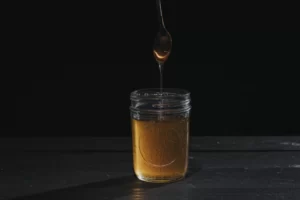Table of Contents
Introduction
Manuka honey (MH) is a type of honey known for its various therapeutic properties, including wound-healing, antimicrobial, antioxidant, and anti-tumor effects. However, there is conflicting evidence regarding the role of MH in inflammatory responses, with some studies suggesting it has pro-inflammatory capacity while others show predominantly anti-inflammatory activity. This study aims to characterize the immunomodulatory capacity of MH using both in vitro and in vivo approaches, with a focus on the underlying mechanisms.
In Vitro Studies
In the current study, RAW 264.7 macrophages were treated with 1% MH (w/v) for various time periods. The results showed a significant increase in the gene expression and secretion of tumor necrosis factor-alpha (TNF-α) after MH treatment. Other inflammatory cytokines and chemokines, including interleukin-1β (IL-1β), interleukin-6 (IL-6), inducible nitric oxide synthase (iNOS), CXCL2, and CCL2, were also upregulated. These findings suggest that MH has the ability to induce an inflammatory response in macrophages.
In Vivo Studies
Intraperitoneal (i.p.) administration of MH in C57BL/6 mice resulted in a significant expansion of peritoneal exudate cells (PECs), mainly due to the recruitment of neutrophils. Importantly, this response was observed even in toll-like receptor 4 (TLR4)-defective C3H/HeJ mice, indicating that it is independent of TLR4 and unlikely to be mediated by any lipopolysaccharide (LPS) contaminant. MH administration also led to changes in the phenotypic expression and functional maturation of peritoneal macrophages, including a shift towards the CD11b lo F4/80 lo phenotype and an increase in the expression of major histocompatibility complex (MHC) class II proteins.
Role of MyD88 Protein
The role of the MyD88 protein, a critical adaptor of most TLR signaling pathways, in the MH-induced immune response was also investigated. The results showed that the MH-initiated peritoneal response was largely abrogated in mice deficient in MyD88 protein. This suggests that the observed effect of MH is dependent on MyD88-mediated signaling pathways.
Conclusion
In conclusion, this study provides evidence for the immunostimulatory properties of MH and highlights its potential as an immunomodulatory agent. MH was shown to induce the production of inflammatory cytokines and chemokines in macrophages, recruit neutrophils into the peritoneal cavity, and promote the functional maturation of peritoneal macrophages. These effects were found to be dependent on TLR signaling and MyD88-mediated pathways. The findings of this study contribute to a better understanding of the immunomodulatory role of MH and its potential utility in various disorders.



